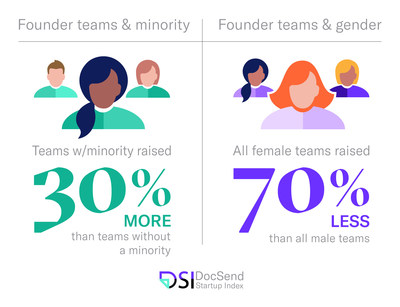New Report on Funding Divide Shows Progress for Founder Teams with Minorities, Hurdles for All-Female Teams
Dropbox's DocSend released a report detailing the fundraising landscape for startup founder teams. In 2020, teams with minority members raised 30% more than those without, while all-female teams raised 70% less than all-male teams, averaging $195,000 versus $659,529. The report analyzed data from 200 startups, highlighting that all-female teams spent 21% less time fundraising and had fewer investor meetings. Despite progress for minority-led teams, the report emphasizes the need for more support for all-female teams in securing funding.
- Minority-led founder teams raised 30% more in early-stage capital than teams without minority members in 2020.
- Increased VC focus on diversity has led to more funding opportunities for minority-led startups.
- All-female teams raised $195,000 on average, 70% less than all-male teams' average of $659,529.
- All-female teams spent 21% less time fundraising than all-male teams, indicating potential discouragement.
Insights
Analyzing...
SAN FRANCISCO, May 6, 2021 /PRNewswire/ -- Dropbox (NASDAQ: DBX) today announced that DocSend, a secure document sharing platform, released a new research report showing definitive progress in fundraising success for startup founder teams with minorities, but greater hurdles for all-female founder teams seeking capital for their businesses.
When raising early-stage capital (pre-seed or seed round) in 2020, founder teams with minority members raised
The report, The Funding Divide: Tracking Bias in Early-Stage Fundraising, is a comprehensive analysis of the early-stage startup fundraising process looking at how founder team demographics like gender and race can affect the productivity and success of their fundraising.
DocSend surveyed 200 startups at the pre-seed and seed stage and analyzed pitch decks slide-by-slide to understand how VCs scrutinize pitch decks. All data comes from companies that opted into the process and was gathered across 2020 and 2021.
"For women and minorities pursuing fundraising, 2020 was one step forward, two steps back," said Russ Heddleston, CEO and co-founder of DocSend. "While we see progress in the ability of teams with minorities to fundraise, all-female teams have fallen behind. The positive movement for founder teams with minorities is encouraging, but we clearly need more support for all-female founder teams."
"With last year's renewed focus on diversity and social justice, many VCs were very mindful of the fact that they may not have given enough attention to minority-led businesses in the past," said James Norman, Partner at Transparent Collective. "While the numbers here are encouraging for pre-seed and seed-stage minority-led founders, I've seen Series A and later-stage startups have even more success in getting funding. Over the past year, VCs were focused on more experienced startups with a clear track record, which makes sense. But there are still a significant number of viable and valuable earlier-stage minority-led startups not getting the attention they deserve. Let's hope that these numbers continue to increase and lead to stronger funding activity for this group as a whole."
Weeks Spent Fundraising Further Indicates All-Female Team Struggle
In 2020 on average, all-female teams spent
When taken into account that all-female teams raised the least overall, they may have given up on fundraising more quickly after struggling to gain traction among investors or cut short their raise after not making enough progress toward their targets.
More Scrutinization Led to More Success in 2020
The time investors spend on decks is a highly contextual measurement: more time spent can be a positive indicator when linked to successful fundraising outcomes, but it can also be a negative sign of increased scrutiny when it correlates with less successful outcomes.
As we showed in our 2021 Pre-Seed Fundraising Research, in 2020, decks from startups that ultimately got funded had longer investor viewing times than those that were unsuccessful. Teams with minorities had the longest average viewing times at 4:51, with teams with no minorities at 3:23. All-female teams had the shortest average viewing time of 3:20 in the pre-seed round, with all-male at 3:55. VC time spent analyzing pitch decks further highlights the growing disparity in success between founder teams of different gender and race makeup.
Time Spent on Specific Sections Shows Further Discrepancy
Discrepancies do not just occur in the overall investor viewing time of pitch decks; they also occur within specific deck sections. Seeing as investors spent more time on all-male decks than all-female decks, and all-male teams also greatly out-raised all-female teams, this reflects the trend that more time spent viewing is a sign of a more successful deck.
For example, the 'fundraising ask' section was viewed very differently when comparing male and female teams. This section was the longest-viewed section of all-male decks (66 seconds), but investors spent almost
In addition, investors spent over
For teams with minorities, investors spent more time viewing specific deck sections than for teams without minorities. Investors spent
"Our goal at DocSend is to drive transparency into the fundraising process," continued Heddleston. "This new research sheds light on how industry bias is manifested through VC interactions with pitch decks. With more awareness, and dedicated support and resources, we can continue to bridge the gap in the fundraising process."
To dive deeper into the fundraising divide across pre-seed and seed-stage companies, download the full research report.
About DocSend:
DocSend enables companies to share business-critical documents with ease and get real-time actionable feedback. With DocSend's security and control, startup founders, investors, executives, and business development professionals can build business partnerships that have a lasting impact. Over 19,000 customers of all sizes use DocSend today. Learn more at docsend.com.
Media Contact:
Laura Kubitz
104 West for DocSend
laura.kubitz@104west.com
![]() View original content to download multimedia:http://www.prnewswire.com/news-releases/new-report-on-funding-divide-shows-progress-for-founder-teams-with-minorities-hurdles-for-all-female-teams-301285056.html
View original content to download multimedia:http://www.prnewswire.com/news-releases/new-report-on-funding-divide-shows-progress-for-founder-teams-with-minorities-hurdles-for-all-female-teams-301285056.html
SOURCE DocSend









